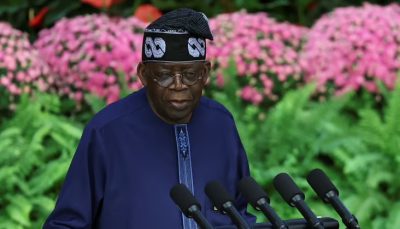Chagoury shifts Tinubu’s attention to Caribbean investment

President Tinubu set for warm welcome in St. Lucia, courtesy of his ally Gilbert Chagoury, even as he faces backlash at home over Benue killings.
Although facing criticisms at home over the spate of killings in Benue, Borno and Plateau states, Nigerian President Bola Tinubu has been lavishly welcomed by the St. Lucia government.
“I wish, on behalf of the government, to first of all apologise to the public for any inconvenience that they will suffer because of the traffic arrangements,” said Ernest Hilaire, St. Lucia’s deputy prime minister and minister for tourism.
“I think the public can appreciate that the president of the Federal Republic of Nigeria is a person of considerable stature and standing. To be our gracious guest during that period is an honour for us in Saint Lucia,” Hilaire said.
He added that Tinubu will address a joint sitting of St Lucia’s House of Assembly and Senate on Monday, 30 June, before proceeding on vacation in the Caribbean until 4 July.
Determined to maximise Tinubu’s visit, the St. Lucia government has invited heads of the Organisation of Eastern Caribbean States (OECS), according to theSt. Lucia Times.
Members include Antigua and Barbuda, Dominica, Grenada, Saint Kitts and Nevis, Saint Lucia, Saint Vincent and the Grenadines, with Guadeloupe, Martinique, Anguilla, Montserrat, and the British Virgin Islands as associate members.
Chagoury’s assist
Trade between Nigeria and the island country has been very low, according to data from the Observatory of Economic Complexity (OEC).
In 2023, Saint Lucia exported $2,400 worth of goods to Nigeria, which was mostly processed fruits and nuts. The data showed that Nigeria’s exports to Saint Lucia as of 2020 were valued at $5,900 with the primary exports being “other edible preparations” and “light pure woven cotton”.
We can be friends without benefits and later become friends with benefits
Yet, two aides close to the president tell The Africa Report that the brains behind Tinubu’s visit is Lebanese-Nigerian billionaire Gilbert Chagoury, whom Tinubu has described as his “partner in development” and confidante.
In Tinubu’s two years in office, Chagoury has secured the largest government contracts, including the Lagos-Calabar coastal highway and the Sokoto-Badagry highway, which jointly exceed a budget of $15bn.
Chagoury was appointed ambassador and permanent delegate of St. Lucia to UNESCO and to the United Nations in Geneva in 1995. Even now, Chagoury — a devout Catholic — is listed on the country’s website as ambassador to the Holy See.
The Lebanese Nigerian is also a recipient of the Order of Saint Lucia, the Saint Lucia Cross, which is one of the highest honours the island nation can confer.
“It will not be out of place if Chagoury’s influence plays a part in President Tinubu’s visit,” says Femi Badejo, the trade commissioner for the Republic of Vanuatu to the Economic Community of West African States (ECOWAS).
Soft power?
Many Nigerians on social media have been curious as to why Tinubu seeks to travel to St. Lucia at a time of national crisis. A spokesman for the president said a statement would be issued in due course.
Although Nigeria and the island nation established diplomatic relations in 1981 and are both members of the Commonwealth, they have not had major interactions.
A key exception is the fact that many wealthy Nigerians have acquired passports from St. Lucia and other Caribbean countries through the citizenship-by-investment route in order to give them easy access to over 100 countries.
Nigeria ranks second after China on the citizenship-by-investment index, according to the migration industry newspaper Investment Migration Insider.
But the United Kingdom has since 2023 issued warnings to these Caribbean countries, including St. Lucia, asking them to modify their citizenship-by-investment scheme. The United States also named St. Lucia, St Kitts and Nevis and other Caribbean nations on a list of possible travel restrictions as the Donald Trump administration pushes visa reforms.
“Citizenship-by-investment has been their economic driver but they are facing constant harassment from wealthier nations who feel they shouldn’t be making that amount of money. Hence these Caribbean countries are trying to diversify,” says Badejo, managing partner at Cersei Partners, a leading citizenship-by-investment firm in Lagos.
In October last year, the prime minister of Grenada, Dickon Mitchell, who doubles as the chairman of the Caribbean Community (CARICOM), met with billionaire Aliko Dangote in Lagos where they discussed possible investment opportunities in the Caribbean, especially in oil, cement, and fertiliser production.
St. Lucia’s population of 179,285 is about 0.08% of Nigeria’s population while its GDP of $2.43bn is less than 100 times that of Nigeria.
For a country desperately in search of Foreign Direct Investment, St. Lucia would not be the first country of choice, critics argue.
Historic and cultural ties
Yet it may be the other way around, argues economist Muda Yusuf, who adds that foreign investments by Nigerian entities to the Caribbean could also increase Nigeria’s inflow.
“Dangote, for instance, has been known to invest overseas. Nigeria’s businessmen can invest in many sectors in the Caribbean, including in the hospitality business. It is a feasible model,” says Yusuf, who heads the Center for the Promotion of Private Enterprise (CPPE).
Yet others believe it is more a form of soft power, as Nigeria seeks to expand its influence both culturally and politically.
Nigeria and the Caribbean share historic and cultural ties — a significant number of people forcibly taken to the islands during the transatlantic slave trade are believed to have come from what is now Nigeria.
“Such visits are not just about investments. They are symbolic. We can be friends without benefits and later become friends with benefits. So when for instance Nigeria seeks a permanent seat at the United Nations, Caribbean nations will give support,” says Muyiwa Falaiye, deputy vice chancellor at the University of Lagos and ex-director at the Institute of African and Diaspora Studies. (The Africa Report)

